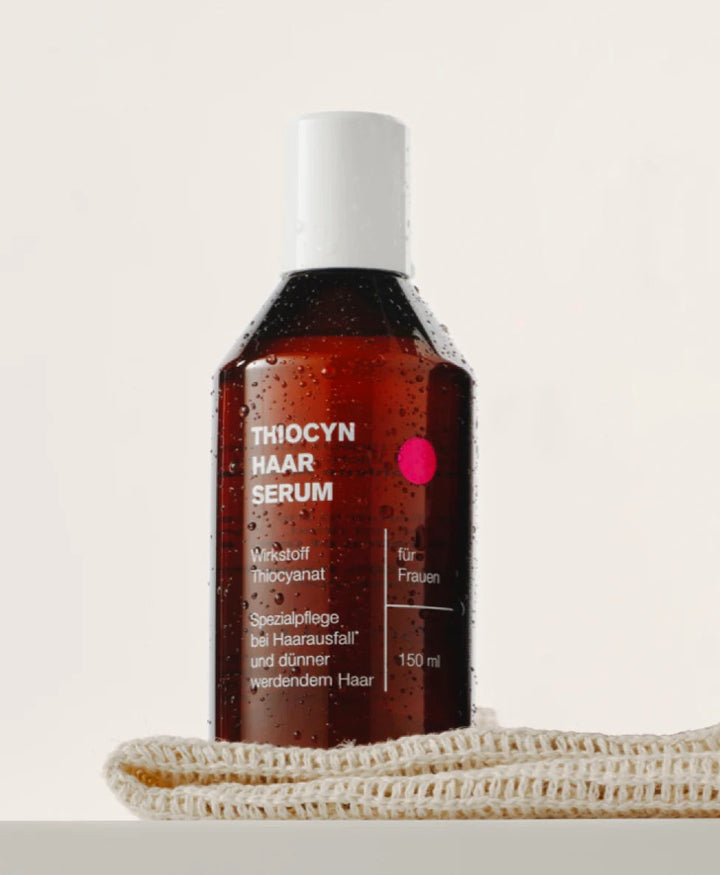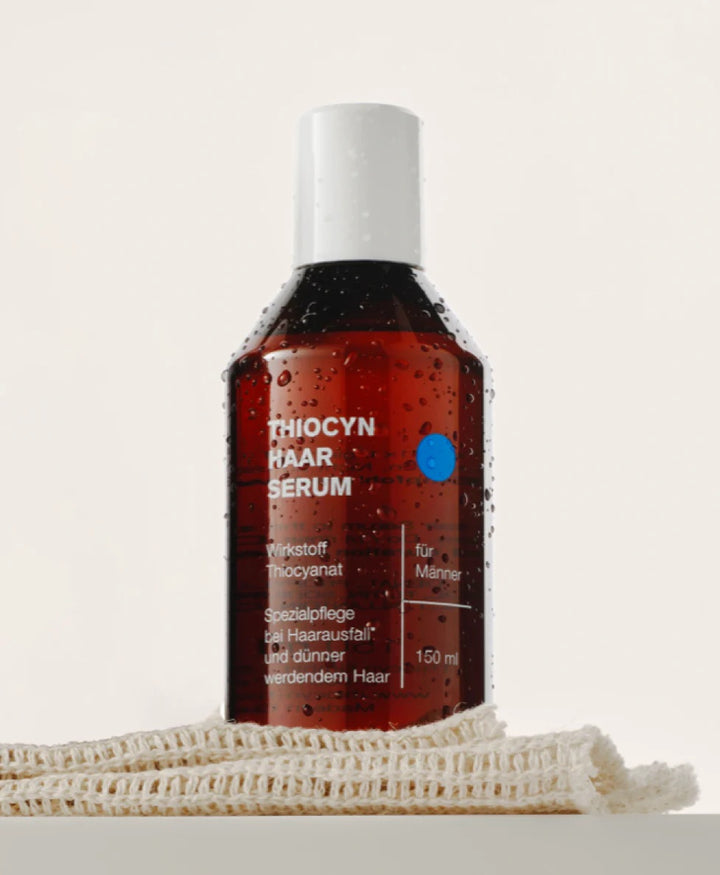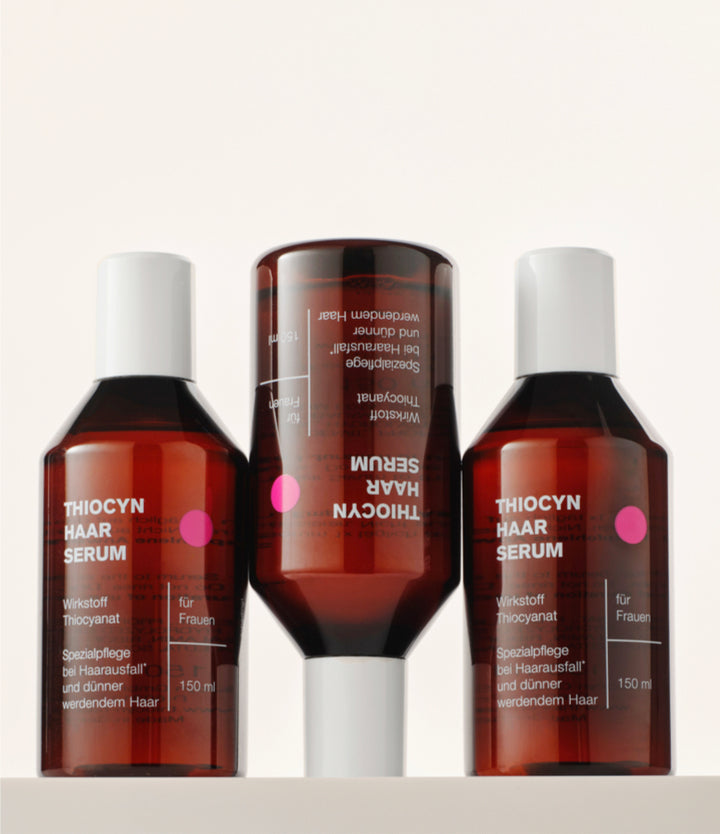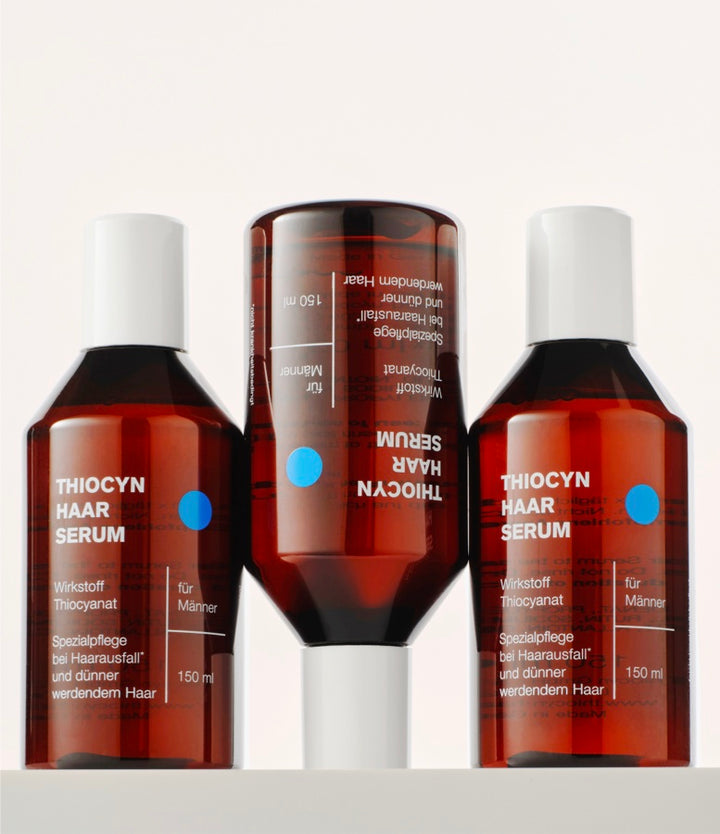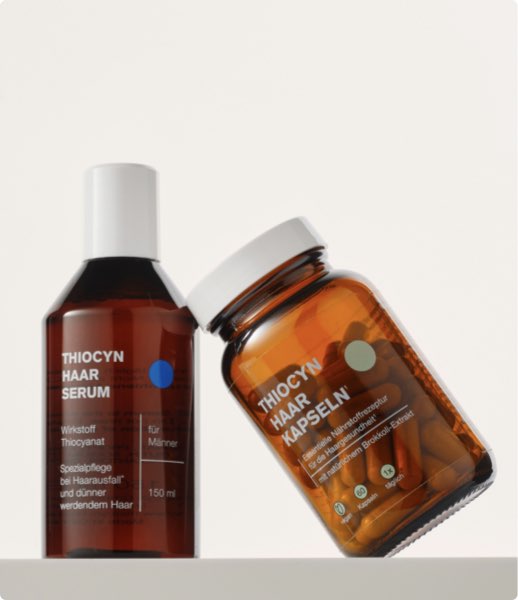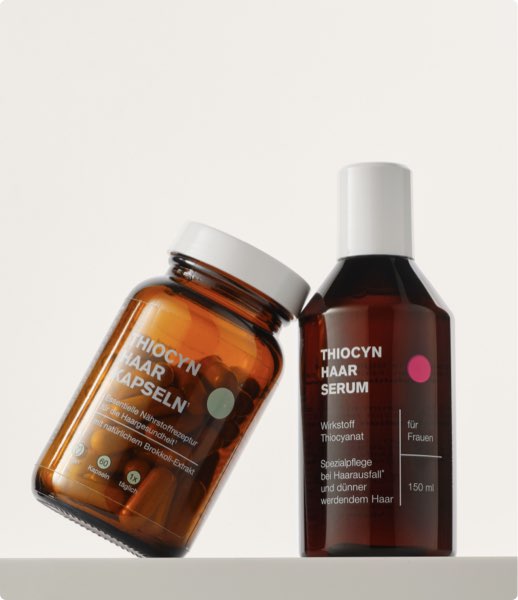| 04. July 2023
Hair loss due to estrogen deficiency

- Estrogens are female hormones that influence a woman's internal processes and, in addition to the menstrual cycle and other processes, also contribute to a healthy hair cycle.
- Estrogen deficiency leads to increased hair loss, among other side effects.
- The origin of estrogen deficiency can be the falling estrogen levels during menopause as well as after pregnancy.
- The solution? Hormone therapy in consultation with your doctor or the use of Thiocyn hair serum.
Estrogens are responsible for the development of female sexual characteristics, as well as for female emotions and thoughts. "Female" sex hormones influence womanhood and are highly relevant to overall health, not least beautiful hair, a healthy hair cycle, and hair growth. Estrogen deficiency often leads to hair loss .
Estrogen deficiency leads to hair loss in women
Estrogen deficiency in women leads to symptoms such as hot flashes and sleep disorders. The cardiovascular system also ages prematurely, and osteoporosis (bone brittleness) develops. Gynecologists cite adrenal insufficiency or cortisol deficiency syndrome as the main causes of estrogen deficiency in young women. In older women , estrogen deficiency occurs with the onset of menopause. Increased hair loss can be observed in both young and older women. Is increased estrogen the right treatment to stop hair loss and stimulate new hair growth?
Natural estrogens as hair growth agents
Many women report that their hair quality improves during pregnancy. Their hair gains volume. Its thickness improves. Their hair shinies like never before. This is no coincidence. The sex hormone estrogen reaches its highest concentration in the female body during pregnancy. As growth hormones, estrogens not only have a positive effect on the maturation of the egg cell and the development of the embryo, but also play an important role in the prenatal adaptations of the female anatomy.
As the baby bump slowly becomes visible and grows during pregnancy, the skin cells in this area of the body must grow particularly rapidly. As a side effect, many pregnant women also experience a fresh, radiant complexion—not least beautiful hair. Hair is part of the scalp; it and its hair follicles respond positively to the growth-promoting effects of estrogen in a similar way to the skin with healthy cell division.
Hair loss after childbirth
Immediately after birth, there is a sharp drop in estrogen levels. The hair follicles suddenly experience a lack of estrogen. Normally, these hair changes are only temporary. Hormonal changes can cause pregnant women to suddenly experience dry, brittle, or greasy hair. These irregularities usually resolve after birth.
If the hair cycle doesn't return to normal automatically, Thiocyn Hair Serum can help restore the balance. Its active formula is based on the natural molecule thiocyanate. Thiocyanate compensates for disruptive factors in hair production without interfering with hormonally controlled metabolic processes; no side effects or interactions are known.
Estrogen deficiency during menopause
During the Menopause , when estrogen levels in the female body drop, is something many women notice very clearly in their hair. The hair thins, and sometimes even the scalp becomes visible. Diagnosis: Diffuse hair loss. The reduction in estrogen also leads to a relative increase in "male" sex hormones (androgens) and often to androgenetic alopecia, meaning that an above-average number of hair follicles react sensitively to the excess of androgens. Hair follicles and hair become miniaturized, and the scalp often becomes visible.
Hormones during menopause
When discussing menopause, symptoms such as hot flashes, depressive moods, dizziness, heart problems, nervousness, sleep disorders, dry mucous membranes, obesity, joint or muscle problems are particularly important, but also Hair loss. To ensure that all of the symptoms mentioned are not due to specific diseases, but rather to the onset of menopause and the associated hormonal changes, it is useful to measure hormone levels in the blood.
Hormone therapy?
The laboratory results provide data on whether estrogen deficiency can be corrected through hormone therapy under medical supervision. Hormones can achieve many positive effects, such as counteracting osteoporosis, but they also cause undesirable side effects. Today we know: It's all about the dose . When used in low doses, individually adjusted, and taking contraindications into account, hormone therapy is now a relatively safe treatment option. When correcting an estrogen deficiency, for example, gynecologists ensure that the two opposing hormones, estrogen and progesterone, remain in balance. Estrogen dominance should be avoided due to the increased risk of breast cancer.
Hair loss therapy
Women who Hair loss Those who are affected by menopause but do not require hormone therapy, or who want to help hair growth – in parallel with hormone therapy – can use the freely available Thiocyn hair serum, with its patented thiocyanate active formula.
Thiocyanate reduces hair loss* and stimulates hair growth naturally, without side effects or interactions, by
– detoxifies radicals that inhibit hair regeneration
– stabilizes cell metabolism
– normalizes the disturbed hair cycle
– strengthens the hair roots
– protects the hair root against growth-disrupting influences
Since Thiocyn hair serum does not interfere with any hormonally controlled metabolic processes, its use does not require medical supervision.
READ BY 23,000 PEOPLE
Join 23,000 others and find out how to improve your hair health with great offers and discounts as well as helpful advice
